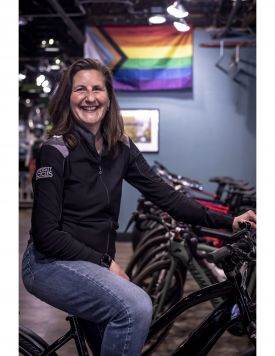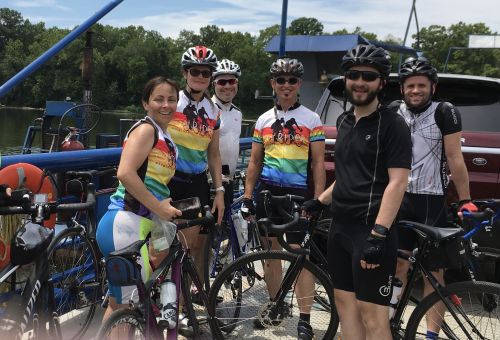A version of this story ran in the June issue of Bicycle Retailer & Industry News. Print subscriptions are free for qualified retailers and industry members, sign up at subscribe.pcspublink.com/websis.
BOULDER, Colo. (BRAIN) — June is Pride Month. BRAIN reached out to LGBTQ+ consumers and shop owners to gauge how our industry's doing. Can we take pride, or is there room for improvement in our shops?
For context, we spoke to industry veterans Nick Andrade and Nancy Grimes. Andrade held high-level sales and management positions in the 1980s and '90s with Giant, Bianchi, Trek and Schwinn.
"My sexuality never came up. I was a sales guy who was judged on how well I performed," Andrade noted. "When I got hired as president of Bianchi in the late '90s, I was in for a shock. One morning there was a termination fax from the Italians who ran the company. 'We don't want one of your types working here.'"
"My next job was as director of sales at Trek Bicycle," Andrade remembered." John Burke told me, 'I don't care who you sleep with, I care who you are and how you do your job.'"
Nancy Grimes was advertising director and then publisher of VeloNews from 1988 to 1996. "Being a lesbian was a non-issue," she said. "I felt marginalized because I was a woman and not a strong rider or a gearhead, not because of my sexuality."
Gay, lesbian and trans consumers described mostly positive shop experiences, while others experienced a condescending attitude. So how can shops be more inclusive?
Hiring LGBTQ staff creates a welcoming shop environment and is easier in urban markets. Scott Binde, co-founder of OUTriders, an LGBTQ+ bike club in Washington, D.C. said, "There's a big difference in my dealings with shops in the DC area where I'm usually comfortable. In rural Virginia it's the opposite."
Binde also noted that women staffers send an inclusive message. "I bought my last bike at a shop where their fitter is a woman," recalled Binde. "When I see women in a higher position, that tells me that shop isn't a 'good old boy' network."
Ryan King, president of the 500-member OUTspokin' bike club in Denver, has had mixed shop experiences. "Many shops miss the mark with the LGBTQ community," King said. "Most riders who join our club aren't gearheads. Shops forget how to deal with us common folk. When I'm spoken to in a condescending manner, it makes me feel like an idiot."
Jesse Brown, a trans man who works for the AIDS/LifeCycle fundraising ride, bought his first nice bike from Helen's Cycles in West LA. His most recent purchase was from DTLA Bikes.
"These shops are just so supportive and kind," Brown said. "I feel safe in a bike shop when I get a friendly greeting. Whether you're trans, gay or straight, we all want the same thing: to be recognized and acknowledged."
When Brown's bike got stolen, Gilbert Romo, owner of The Velo in downtown Phoenix, gave Brown a Felt carbon road bike. Romo, a straight man, has completed the AIDS/LifeCycle ride twice.
"People come in the store and see the ALC jerseys hanging up, they see The Advocate magazine on the counter, they know they're in a safe place," noted Romo. "Our inclusivity wasn't always good for business, now it's become more acceptable."
Flying the Pride flag can influence potential employees as well. Beth Leibo was hired as GM of University Bicycles in Boulder late last year. "University Bicycles hung a Progressive Pride Flag in the store before I started working there and to me, it was another expression of their welcoming atmosphere."
"I've been out longer than most of my staff has been alive," Leibo laughed. "Doug (Emerson) and Lester (Binegar) worked with me as a rep for several years and recruited me based on my qualifications, not my sexual orientation."
Leibo had a few brushes with bias in her time as a rep and said she never let that negativity affect her professionalism. "The majority of the people have been respectful and fun to work in my 20-plus years in the industry," she said.
"I'm excited about the new-found awareness and focus on diversity, equity and inclusion," concluded Leibo. "I hope the cycling industry continues to become even more inclusive."
Binegar, the previous GM and now CFO, hung that Pride flag. "U Bikes has always been welcoming to all, and we wanted to make a clear statement for customers and employees to see every day," Binegar said.
Binde says a big statement isn't necessary. "A small flag decal in the window, a Black Lives Matter sticker, an 'All Are Welcome Here' sticker, they will for sure get noticed and your store recognized as a safe space."
Davey Oil has owned G&O Family Cyclery in Seattle for eight years. "I'm queer and 90% of our staff is queer," Oil said. "We entirely benefit from our commitment to increasing bike access for marginalized customers."
"Visibly queer or trans folk tell us how visits to some shops have left them feeling excluded or ignored," noted Oil. "Homo- and trans-phobia go hand in hand with sexism. The industry clearly has work to do."
"There seem to be more out queer women in the industry than there are out queer men. There's a strong temptation to hide in the closet and that's sad as hell," Oil said.
"If shops want to show their colors, sign up for and support community events, Pride parades, advertise in LGBTQ publications, sponsor clubs and teams, these are all easy steps," concluded Oil.
King said staff behavior is what really counts. He urged shop owners to "be brave" with their staffs. "Owners and managers need to draw the line and call people out when they talk or act unacceptably," King said.
"By not saying anything you're silently agreeing with the attitudes and the language," King emphasized. "You need to have the eggs to say NO. And fire people if it happens again."
Romo summed up his attitude about inclusion. "Our relationship with the gay community is a plus for our business and not everyone agrees. We don't care what people think, we're going to do the right thing."
"Be more than an ad campaign. Create an atmosphere and a culture that allows your people to be brave and inclusive," concluded Romo. "You change the world one person at a time, so start with yourself."


